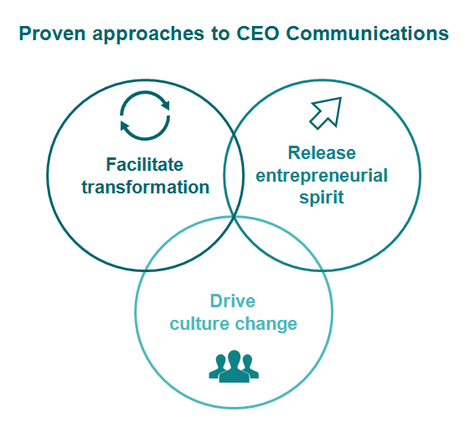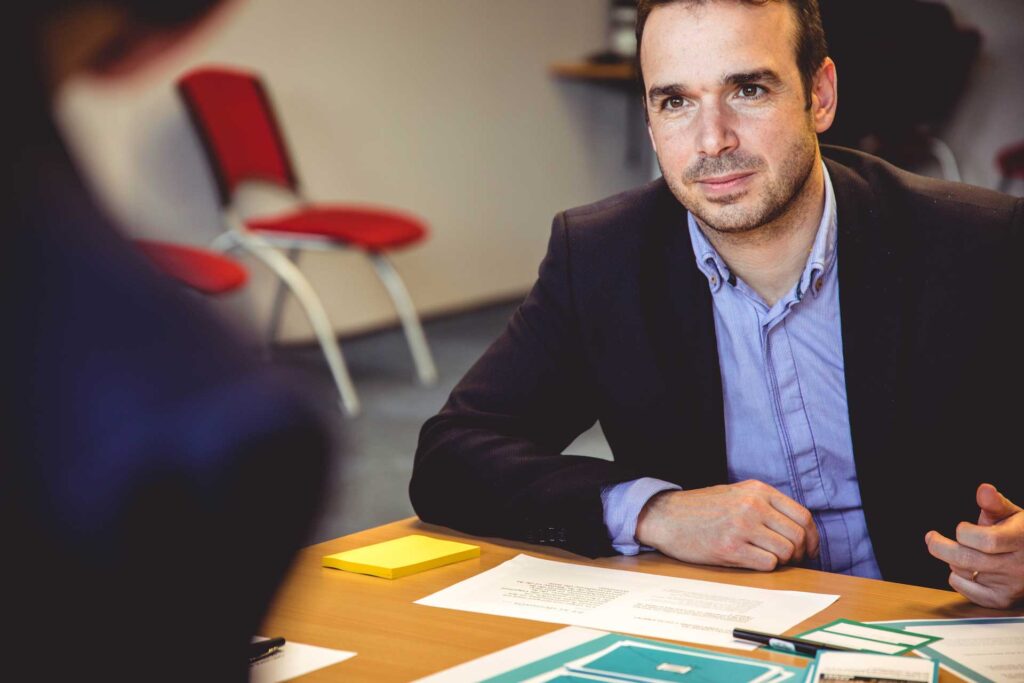While many companies are now digitizing their communications activities to compete in a digital world, one key stakeholder seems to be left behind: the CEO. Oliver Wyman identified this gap specifically in the German language region, across major stock-listed companies, and the argument holds for many small to medium-sized (Mittelstand) companies, too. The call is for CEOs, entrepreneurs and leaders to actively engage and make use of digital communications to drive digital transformation and company success.
CEOs widely recognize that in a digital, customer-led business landscape, the way in which companies talk to their stakeholders has changed: By facilitating and enabling direct exchange between parties, communicating means forming the leadership framework and driving the company overall - rather than just being a support function. In times of digitalization, CEOs want to be creators and take an active part in communicating relevant transformations.
So, what is it that keeps many CEOs from opening accounts on Twitter, LinkedIn and the like? Is it mainly that they are afraid of getting negative feedback on and responses to topics such as leadership style, as some speculate? Is it mainly about time constraints, or even a lacking belief in the effectiveness of social media?
The newly launched European Communications Monitor sheds some light on the question: There is a close connection between communication and company success that puts communication teams more and more in the limelight as drivers of organizational development. At the same time, this is often combined with the lacking awareness of top management of the full range of contributions that communications can deliver. "There's just one problem," says Hootsuite CEO Ryan Holmes. "Most CEOs have no idea how to get started. Social media skills are as foundational today as knowing how to send an email or open a web browser - yet they're missing from the executive toolkit."

So how do you, as a CEO, actually grow your company by communicating? Let's add some practical and proven concepts of digital CEO Communications to the discussion.
Three approaches have worked particularly well, for example, for the accounts of Roland Chalons-Browne, CEO Siemens Financial Services:
(1) Facilitate the transformation that you are in
In turbulent times, rigid structures compete with new flexibility and accurate fulfillment of plans with risk appetite - while change causes resistance. Directing a company towards digital goals requires established processes to be turned upside down, including the associated mindset shift. In this situation, the CEO should act as chief moderator for digital transformation, by explaining the shifts, locating the company's products and solutions in this shift, balancing interests and explaining a higher purpose.
"An organization's culture of purpose answers the critical questions of who it is and why it exists. They have a culture of purpose beyond making a profit."
Punit Renjen, Deloitte
Social media channels such as LinkedIn are excellent platforms for providing such impetus - helping you to reach out to your customers, employees and talents alike. Think beyond promoting your ideas, your business, and your work. Take center stage and write how you can actually change the nature of your industry. This can be achieved through very business-focused stories on developments in your very concrete business environment or focusing on the role of your very specific products, such as "How finance models are developing to drive organizational and digital transformation" in the case of Roland Chalons-Browne.
(2) Drive culture change
The clever application of digital communication forms - podcasts, videos, Youtube, Twitter and the combination of all of these with hosted physical events and gatherings - can help CEOs to be accessible. You have the opportunity to share a culture that understands communication not as a one-way lane, but as an exchange at eye level with employees, customers and other stakeholders. Consequently, social savviness is developing into a success criterion for leaders who shape business culture. DDI measured that social CEO candidates excel in several behaviors and are, for example, 89% more effective than non-social CEO candidates at empowering and 46% more effective at influencing others.

Recently, Daimler CEO Dieter Zetsche described his approach to the key question: "How do you go viral with cultural change?" His number one advice is not to copy, but to find your own way to translate change into your company. Likewise, driving culture change requires you to communicate in many small steps - starting by getting into the machine room and involving your employees: for example, in interactive discussions and Town Hall Meetings. It can also include very formal steps such as what Amazon CEO Jeff Bezos practices through his annual letter to shareholders. In all of this, your presence and commitment as CEO are clear drivers of stakeholder engagement.
(3) Release your entrepreneurial spirit
Social CEOs facilitate transformation, drive culture change and, quite simply, manage the flow of real-time information and communication: This way, you bring yourself into a proactive mode and simultaneously develop your entrepreneurial judgement and spirit. In short: "Social CEOs are more apt to take action, and less predisposed to judgment-impairing attributes."
"Big dreams capture imaginations and push people to push themselves."
Bill McDermott, SAP
The direct exchange with customers, employees and peers, showing what you have done and currently do in business via social media can help you to overcome roadblocks and develop as an authentic leader, drive the topics that you own, and position yourself as an expert in your field. Tesla CEO Elon Musk goes as far as announcing entire new product lines exclusively via Twitter. At Siemens, Roland Chalons-Browne has created engagement with a variety of news topics, such as by announcing a new business location or commenting on innovative technologies that stand in relation to his personal interests. You have a passion for aviation, sailing or cycling? Sharing it with your community is worth it.
Getting social is one way for CEOs - of big and small companies alike - to lead by communicating. The opportunity is to go beyond the role of brand ambassador and spokesperson to drive change and development: Be engaged where your employees, customers, competitors, investors and other stakeholders are - use your unique communication power as CEO to drive your company's success!
The article was also published on LinkedIn:
https://www.linkedin.com/post/edit/3-proven-ways-ceos-drive-success-leading-hartmut-huebner



